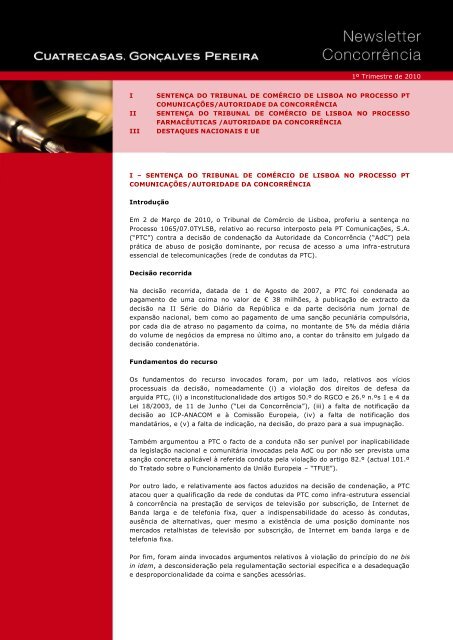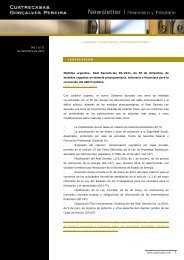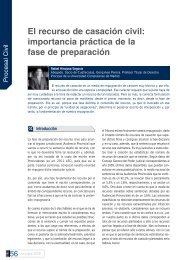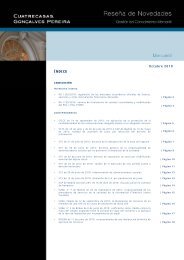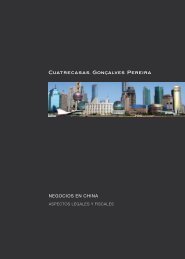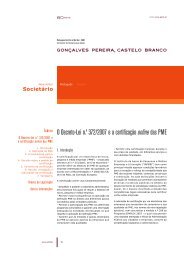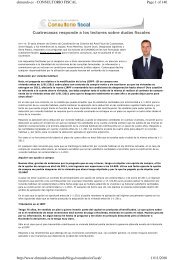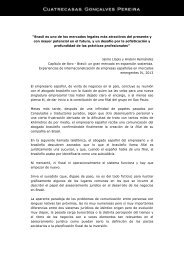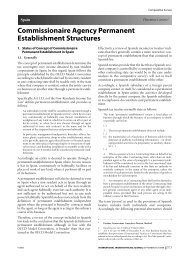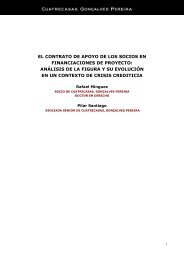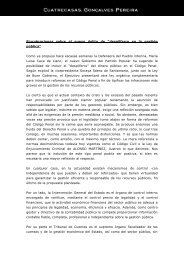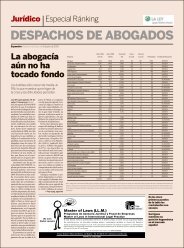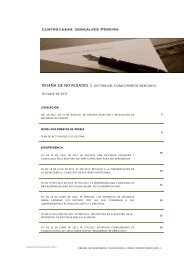i sentença do tribunal de comércio de lisboa no ... - Cuatrecasas
i sentença do tribunal de comércio de lisboa no ... - Cuatrecasas
i sentença do tribunal de comércio de lisboa no ... - Cuatrecasas
Create successful ePaper yourself
Turn your PDF publications into a flip-book with our unique Google optimized e-Paper software.
1º Trimestre <strong>de</strong> 2010<br />
I<br />
II<br />
III<br />
SENTENÇA DO TRIBUNAL DE COMÉRCIO DE LISBOA NO PROCESSO PT<br />
COMUNICAÇÕES/AUTORIDADE DA CONCORRÊNCIA<br />
SENTENÇA DO TRIBUNAL DE COMÉRCIO DE LISBOA NO PROCESSO<br />
FARMACÊUTICAS /AUTORIDADE DA CONCORRÊNCIA<br />
DESTAQUES NACIONAIS E UE<br />
I – SENTENÇA DO TRIBUNAL DE COMÉRCIO DE LISBOA NO PROCESSO PT<br />
COMUNICAÇÕES/AUTORIDADE DA CONCORRÊNCIA<br />
Introdução<br />
Em 2 <strong>de</strong> Março <strong>de</strong> 2010, o Tribunal <strong>de</strong> Comércio <strong>de</strong> Lisboa, proferiu a <strong>sentença</strong> <strong>no</strong><br />
Processo 1065/07.0TYLSB, relativo ao recurso interposto pela PT Comunicações, S.A.<br />
(“PTC”) contra a <strong>de</strong>cisão <strong>de</strong> con<strong>de</strong>nação da Autorida<strong>de</strong> da Concorrência (“AdC”) pela<br />
prática <strong>de</strong> abuso <strong>de</strong> posição <strong>do</strong>minante, por recusa <strong>de</strong> acesso a uma infra-estrutura<br />
essencial <strong>de</strong> telecomunicações (re<strong>de</strong> <strong>de</strong> condutas da PTC).<br />
Decisão recorrida<br />
Na <strong>de</strong>cisão recorrida, datada <strong>de</strong> 1 <strong>de</strong> Agosto <strong>de</strong> 2007, a PTC foi con<strong>de</strong>nada ao<br />
pagamento <strong>de</strong> uma coima <strong>no</strong> valor <strong>de</strong> € 38 milhões, à publicação <strong>de</strong> extracto da<br />
<strong>de</strong>cisão na II Série <strong>do</strong> Diário da República e da parte <strong>de</strong>cisória num jornal <strong>de</strong><br />
expansão nacional, bem como ao pagamento <strong>de</strong> uma sanção pecuniária compulsória,<br />
por cada dia <strong>de</strong> atraso <strong>no</strong> pagamento da coima, <strong>no</strong> montante <strong>de</strong> 5% da média diária<br />
<strong>do</strong> volume <strong>de</strong> negócios da empresa <strong>no</strong> último a<strong>no</strong>, a contar <strong>do</strong> trânsito em julga<strong>do</strong> da<br />
<strong>de</strong>cisão con<strong>de</strong>natória.<br />
Fundamentos <strong>do</strong> recurso<br />
Os fundamentos <strong>do</strong> recurso invoca<strong>do</strong>s foram, por um la<strong>do</strong>, relativos aos vícios<br />
processuais da <strong>de</strong>cisão, <strong>no</strong>meadamente (i) a violação <strong>do</strong>s direitos <strong>de</strong> <strong>de</strong>fesa da<br />
arguida PTC, (ii) a inconstitucionalida<strong>de</strong> <strong>do</strong>s artigos 50.º <strong>do</strong> RGCO e 26.º n.ºs 1 e 4 da<br />
Lei 18/2003, <strong>de</strong> 11 <strong>de</strong> Junho (“Lei da Concorrência”), (iii) a falta <strong>de</strong> <strong>no</strong>tificação da<br />
<strong>de</strong>cisão ao ICP-ANACOM e à Comissão Europeia, (iv) a falta <strong>de</strong> <strong>no</strong>tificação <strong>do</strong>s<br />
mandatários, e (v) a falta <strong>de</strong> indicação, na <strong>de</strong>cisão, <strong>do</strong> prazo para a sua impugnação.<br />
Também argumentou a PTC o facto <strong>de</strong> a conduta não ser punível por inaplicabilida<strong>de</strong><br />
da legislação nacional e comunitária invocadas pela AdC ou por não ser prevista uma<br />
sanção concreta aplicável à referida conduta pela violação <strong>do</strong> artigo 82.º (actual 101.º<br />
<strong>do</strong> Trata<strong>do</strong> sobre o Funcionamento da União Europeia – “TFUE”).<br />
Por outro la<strong>do</strong>, e relativamente aos factos aduzi<strong>do</strong>s na <strong>de</strong>cisão <strong>de</strong> con<strong>de</strong>nação, a PTC<br />
atacou quer a qualificação da re<strong>de</strong> <strong>de</strong> condutas da PTC como infra-estrutura essencial<br />
à concorrência na prestação <strong>de</strong> serviços <strong>de</strong> televisão por subscrição, <strong>de</strong> Internet <strong>de</strong><br />
Banda larga e <strong>de</strong> telefonia fixa, quer a indispensabilida<strong>de</strong> <strong>do</strong> acesso às condutas,<br />
ausência <strong>de</strong> alternativas, quer mesmo a existência <strong>de</strong> uma posição <strong>do</strong>minante <strong>no</strong>s<br />
merca<strong>do</strong>s retalhistas <strong>de</strong> televisão por subscrição, <strong>de</strong> Internet em banda larga e <strong>de</strong><br />
telefonia fixa.<br />
Por fim, foram ainda invoca<strong>do</strong>s argumentos relativos à violação <strong>do</strong> princípio <strong>do</strong> ne bis<br />
in i<strong>de</strong>m, a <strong>de</strong>sconsi<strong>de</strong>ração pela regulamentação sectorial específica e a <strong>de</strong>sa<strong>de</strong>quação<br />
e <strong>de</strong>sproporcionalida<strong>de</strong> da coima e sanções acessórias.<br />
www.gpcb.pt 1
Senti<strong>do</strong> da <strong>sentença</strong><br />
Relativamente aos vícios processuais alega<strong>do</strong>s, o Tribunal enten<strong>de</strong>u que não tinham<br />
fundamento. Em particular, o Tribunal não consi<strong>de</strong>rou proce<strong>de</strong>nte o argumento da<br />
ilegalida<strong>de</strong> da não concentração da acusação num único acto processual, <strong>de</strong>corrente<br />
da existência <strong>de</strong> duas <strong>no</strong>tas <strong>de</strong> ilicitu<strong>de</strong>.<br />
Contu<strong>do</strong>, a <strong>sentença</strong> veio julgar totalmente proce<strong>de</strong>nte o recurso interposto.<br />
De facto, o Tribunal <strong>de</strong> Comércio <strong>de</strong> Lisboa consi<strong>de</strong>rou que a AdC não provou que a<br />
PTC era <strong>de</strong>tentora <strong>de</strong> uma infra-estrutura essencial para a construção <strong>de</strong> uma re<strong>de</strong><br />
cabo que permitisse a prestação <strong>de</strong> serviços <strong>de</strong> televisão por subscrição, internet <strong>de</strong><br />
banda larga e telefonia fixa.<br />
Enten<strong>de</strong>u, pois, o Tribunal que a recusa <strong>de</strong> acesso <strong>no</strong>s troços em questão não ficou<br />
provada como injustificada e/ou discriminatória, e, <strong>de</strong> igual forma, não foi também<br />
prova<strong>do</strong> que a referida recusa tenha constituí<strong>do</strong> um entrave aos opera<strong>do</strong>res<br />
concorrentes para a construção e expansão da re<strong>de</strong> <strong>de</strong>stes.<br />
Consequentemente, tais actos não foram consi<strong>de</strong>ra<strong>do</strong>s nesta <strong>sentença</strong> como abusos<br />
da sua posição <strong>do</strong>minante, ten<strong>do</strong> a recorrente PTC si<strong>do</strong> absolvida da prática das<br />
contra-or<strong>de</strong>nações <strong>de</strong> que era acusada.<br />
Recurso da AdC<br />
No seguimento <strong>de</strong>sta <strong>sentença</strong>, em 12 <strong>de</strong> Março a AdC interpôs recurso da <strong>de</strong>cisão <strong>do</strong><br />
Tribunal <strong>de</strong> Comércio <strong>de</strong> Lisboa para o Tribunal da Relação <strong>de</strong> Lisboa.<br />
Este é o primeiro recurso apresenta<strong>do</strong> pela AdC <strong>de</strong> uma <strong>de</strong>cisão <strong>de</strong> absolvição <strong>do</strong><br />
Tribunal <strong>de</strong> Comércio <strong>de</strong> Lisboa, mostran<strong>do</strong> o seu <strong>de</strong>sacor<strong>do</strong> com vários aspectos<br />
fundamentais da <strong>de</strong>cisão, e apelan<strong>do</strong> a que o Tribunal <strong>de</strong> recurso suscite, <strong>de</strong> acor<strong>do</strong><br />
com o TFUE, a pronúncia prévia <strong>do</strong> Tribunal <strong>de</strong> Justiça da União Europeia sobre o uso<br />
da <strong>do</strong>utrina das infra-estruturas essenciais.<br />
Conclusão<br />
Apesar <strong>de</strong> estar agora pen<strong>de</strong>nte o recurso da AdC, esta <strong>de</strong>cisão <strong>do</strong> Tribunal <strong>do</strong><br />
Comércio assume uma relevância fundamental <strong>no</strong> âmbito <strong>do</strong> <strong>de</strong>senvolvimento e da<br />
aplicação da Lei da Concorrência em Portugal.<br />
Se, por um la<strong>do</strong>, foram abordadas várias questões processuais <strong>de</strong> gran<strong>de</strong> impacto na<br />
actuação, quer das empresas, quer da AdC, <strong>no</strong> âmbito <strong>de</strong>stes processos, por outro<br />
la<strong>do</strong>, para a AdC esta <strong>sentença</strong> transmite alguma <strong>de</strong>sacreditação <strong>no</strong> esforço e<br />
empenho que havia emergi<strong>do</strong> em 2007 naquela que foi a sua primeira <strong>de</strong>cisão <strong>de</strong><br />
con<strong>de</strong>nação por abuso <strong>de</strong> posição <strong>do</strong>minante.<br />
Com esta <strong>sentença</strong>, a AdC vê o seu ónus acresci<strong>do</strong> <strong>no</strong>s restantes processos <strong>de</strong> abuso<br />
<strong>de</strong> posição <strong>do</strong>minante, <strong>no</strong>s quais é também arguida a PTC.<br />
www.gpcb.pt 2
II – SENTENÇA DO TRIBUNAL DE COMÉRCIO DE LISBOA NO PROCESSO<br />
FARMACÊUTICAS/AUTORIDADE DA CONCORRÊNCIA<br />
Introdução<br />
Em 7 <strong>de</strong> Janeiro <strong>de</strong> 2010, o Tribunal <strong>de</strong> Comércio <strong>de</strong> Lisboa, proferiu a <strong>sentença</strong> <strong>no</strong><br />
Processo relativo ao recurso interposto pela ABBOT – LABORATÓRIOS, LDA.<br />
(“ABBOT”), pela MENARINI DIAGNÓSTICOS, LDA. (“MENARINI”) e pela JOHNSON &<br />
JOHNSON, LDA. (“JOHNSON”) (em conjunto, as “Arguidas”) contra a <strong>de</strong>cisão da AdC<br />
<strong>de</strong> con<strong>de</strong>nação daquelas da prática <strong>de</strong> contra-or<strong>de</strong>nações <strong>de</strong> práticas restritivas da<br />
concorrência, <strong>de</strong>signadamente, acor<strong>do</strong>s e práticas concertadas.<br />
Decisão recorrida<br />
Na <strong>de</strong>cisão recorrida, datada <strong>de</strong> 10 <strong>de</strong> Janeiro <strong>de</strong> 2008, foi imputada às empresas<br />
acima referidas, uma prática concertada com vista ao aumento <strong>do</strong>s preços <strong>no</strong> âmbito<br />
<strong>de</strong> concursos públicos para aquisição <strong>de</strong> bens <strong>no</strong> segmento hospitalar, <strong>no</strong>meadamente<br />
para aquisição <strong>do</strong> reagente para <strong>de</strong>terminação <strong>de</strong> glicose <strong>no</strong> sangue a quatro<br />
farmacêuticas.<br />
A ABBOT foi con<strong>de</strong>nada ao pagamento <strong>de</strong> coimas individuais <strong>no</strong> valor <strong>de</strong> €200.000,00<br />
e ao pagamento da coima única <strong>de</strong> €7.000.000,00; a MENARINI foi con<strong>de</strong>nada ao<br />
pagamento <strong>de</strong> coimas individuais <strong>no</strong> valor <strong>de</strong> € 200.000,00 e ao pagamento da coima<br />
única <strong>de</strong> €5.400.000,00 (esta reduzida ao montante <strong>de</strong> €2.812.022,22,<br />
correspon<strong>de</strong>nte a 20% <strong>do</strong> seu volume <strong>de</strong> negócios <strong>no</strong> exercício <strong>de</strong> 2004) e a JOHNSON<br />
foi con<strong>de</strong>nada ao pagamento <strong>de</strong> uma coima <strong>no</strong> valor <strong>de</strong> €658.413,22. As Arguidas<br />
foram ainda con<strong>de</strong>nadas à publicação <strong>de</strong> extracto da <strong>de</strong>cisão na II Série <strong>do</strong> Diário da<br />
República e da parte <strong>de</strong>cisória num jornal <strong>de</strong> expansão nacional.<br />
Senti<strong>do</strong> da <strong>sentença</strong><br />
O Tribunal consi<strong>de</strong>rou como prova<strong>do</strong> que os representantes das Arguidas se reuniam,<br />
frequentemente na se<strong>de</strong> da APIFARMA, e que discutiam os preços a aplicar aos<br />
produtos em concursos públicos, bem como a margem <strong>de</strong> aumento progressivo <strong>do</strong>s<br />
mesmos.<br />
Com esta prática, as Arguidas preten<strong>de</strong>ram obter directamente uma subida <strong>do</strong>s preços<br />
<strong>de</strong>ste produto pratica<strong>do</strong> <strong>no</strong> âmbito <strong>do</strong>s concursos hospitalares, <strong>de</strong> forma a reduzirem a<br />
discrepância entre o seu preço <strong>no</strong> sector hospitalar e aquele que vinha sen<strong>do</strong> pratica<strong>do</strong> <strong>no</strong><br />
sector farmacêutico, com o que visavam também diminuir as probabilida<strong>de</strong>s <strong>de</strong> o<br />
Ministério da Saú<strong>de</strong> rever em baixa os preços <strong>de</strong>stes últimos.<br />
Com efeito, para o Tribunal ficou assente que as Arguidas agiram com a intenção <strong>de</strong><br />
aumentar in<strong>de</strong>vidamente os preços constantes das propostas apresentadas <strong>no</strong>s<br />
concursos hospitalares, a fim <strong>de</strong> alcançar o aumento <strong>do</strong>s preços <strong>no</strong>s produtos<br />
vendi<strong>do</strong>s ao público, falsean<strong>do</strong> os preços em alta mediante uma estratégia <strong>de</strong>lineada<br />
em conjunto e concretizada em diversos hospitais <strong>do</strong> país.<br />
Conclusão<br />
Não obstante a AdC ter ti<strong>do</strong> <strong>de</strong> repetir alguns actos processuais por <strong>de</strong>cisão <strong>do</strong><br />
Tribunal <strong>do</strong> Comércio <strong>de</strong> Abril <strong>de</strong> 2007, a <strong>de</strong>cisão da AdC veio a ser confirmada pela<br />
presente <strong>sentença</strong> que <strong>de</strong>cidiu aplicar à ABBOT uma coima <strong>no</strong> valor <strong>de</strong> €3.000.000,00,<br />
à MENARINI uma coima <strong>no</strong> valor <strong>de</strong> €2.000.000,00 e à JOHNSON uma coima <strong>no</strong> valor<br />
<strong>de</strong> €70.000,00.<br />
www.gpcb.pt 3
Esta <strong>de</strong>cisão é, pois, relevante, na medida em que consi<strong>de</strong>ra que para existir práticas<br />
concertadas não é necessário que exista um pla<strong>no</strong> comum <strong>de</strong> actuação entre as<br />
empresas arguidas, sen<strong>do</strong> suficiente que estas se informem previamente da atitu<strong>de</strong><br />
recíproca que têm intenção <strong>de</strong> a<strong>do</strong>ptar e que resulte <strong>de</strong>ssa atitu<strong>de</strong> um equilíbrio <strong>de</strong><br />
preços diferente daquele que resultaria da aplicação das regras da livre concorrência.<br />
III- DESTAQUES NACIONAIS E UE<br />
AUTORIDADE DA CONCORRÊNCIA<br />
Comunica<strong>do</strong> 4/2010 - Autorida<strong>de</strong> da Concorrência opõe-se à concentração<br />
Ongoing/Vertix/Media Capital<br />
Em 30 <strong>de</strong> Março <strong>de</strong> 2010, a Autorida<strong>de</strong> da Concorrência (“AdC”) emitiu um<br />
comunica<strong>do</strong> 1 , <strong>no</strong> qual divulgou a sua <strong>de</strong>cisão <strong>de</strong> se opor à concentração<br />
Ongoing/Vertix/Media Capital 2 .<br />
A referida operação <strong>de</strong> concentração, <strong>no</strong>tificada a 8 <strong>de</strong> Outubro <strong>de</strong> 2009, consistia na<br />
aquisição, pelas empresas Ongoing Media, SGPS, S.A. (“Ongoing”) e Vertix, SGPS,<br />
S.A. (“Vertix”) <strong>do</strong> controlo conjunto sobre a empresa Grupo Media Capital, SGPS, S.A.<br />
(“Media Capital”), através da aquisição, pela primeira, das acções representativas <strong>de</strong><br />
até 35% <strong>do</strong> seu capital social, e com base <strong>no</strong> acor<strong>do</strong> parassocial a celebrar entre a<br />
Ongoing e a Vertix.<br />
O processo ficou suspenso <strong>de</strong>s<strong>de</strong> 14 <strong>de</strong> Outubro <strong>de</strong> 2009 até 10 <strong>de</strong> Fevereiro <strong>de</strong> 2010,<br />
data em que foi emiti<strong>do</strong> o parecer da Entida<strong>de</strong> Regula<strong>do</strong>ra da Comunicação Social<br />
(“ERC”), <strong>no</strong> qual esta manifestou a sua oposição à operação projectada, <strong>de</strong>vi<strong>do</strong> à já<br />
existente participação da Ongoing <strong>no</strong> capital social da Impresa – Socieda<strong>de</strong> Gestora <strong>de</strong><br />
Participações Sociais, S.A. (“Impresa”), o maior grupo <strong>de</strong> comunicação social em<br />
Portugal.<br />
A ERC impôs como condições à realização da operação, que a participação da Ongoing<br />
na Impresa não ultrapassasse 1% e que aquela não <strong>de</strong>tivesse direitos <strong>de</strong>, isolada ou<br />
conjuntamente com outros accionistas, interferir em quaisquer assuntos inter<strong>no</strong>s da<br />
Impresa, sociais, editoriais ou <strong>de</strong> outra natureza.<br />
Em consequência <strong>do</strong> parecer negativo, <strong>de</strong> natureza vinculativa, da ERC, a AdC<br />
pronunciou-se <strong>no</strong> senti<strong>do</strong> da oposição à operação <strong>no</strong>tificada, para protecção <strong>do</strong><br />
interesse público <strong>de</strong> salvaguarda da diversida<strong>de</strong> e <strong>do</strong> pluralismo, manifesta<strong>do</strong> pela<br />
ERC.<br />
AUTORIDADE DA CONCORRÊNCIA<br />
Comunica<strong>do</strong> 02/2010 – Análise da AdC sobre preços nas comunicações<br />
móveis<br />
Em 5 <strong>de</strong> Março <strong>de</strong> 2010, a AdC publicou o seu relatório <strong>de</strong> análise ao merca<strong>do</strong> das<br />
comunicações móveis em Portugal, análise esta iniciada na sequência <strong>do</strong> anúncio e<br />
a<strong>do</strong>pção pelos três principais opera<strong>do</strong>res <strong>de</strong> re<strong>de</strong>s <strong>de</strong> comunicações móveis nacionais<br />
<strong>do</strong> aumento <strong>de</strong> preços <strong>de</strong> 2,5% (aplicáveis a partir <strong>de</strong> Março <strong>de</strong> 2009).<br />
Da referida análise não ficou prova<strong>do</strong> que o aumento <strong>de</strong> preços resulta da existência<br />
<strong>de</strong> práticas restritivas da concorrência, <strong>de</strong>signadamente <strong>de</strong> um acor<strong>do</strong> ou prática<br />
concertada, <strong>no</strong>s termos da Lei da Concorrência.<br />
1 Comunica<strong>do</strong> n.º 4/2010, disponível em http://www.concorrencia.pt/<strong>do</strong>wnload/comunica<strong>do</strong>2010_04.pdf<br />
2 Processo 41/2009 - ONGOING/PRISA/MEDIA CAPITAL.<br />
www.gpcb.pt 4
AUTORIDADE DA CONCORRÊNCIA<br />
Relatório preliminar da AdC “Relações Comerciais entre a Gran<strong>de</strong> Distribuição<br />
Agro-Alimentar e os seus Fornece<strong>do</strong>res”<br />
O Relatório preliminar da AdC (“Relatório”) foi divulga<strong>do</strong> <strong>no</strong> dia 5 <strong>de</strong> Janeiro <strong>de</strong> 2010.<br />
O Relatório surgiu na sequência <strong>de</strong> questões dirigidas à AdC, relativamente a um<br />
suposto <strong>de</strong>sequilíbrio nas relações comerciais entre fornece<strong>do</strong>res e distribui<strong>do</strong>res, que<br />
assentaria, sobretu<strong>do</strong>, <strong>no</strong> po<strong>de</strong>r <strong>de</strong> compra <strong>de</strong>ti<strong>do</strong> pela distribuição, <strong>de</strong>corrente,<br />
<strong>no</strong>meadamente, <strong>do</strong> movimento <strong>de</strong> concentrações a esse nível, e da consequente maior<br />
<strong>de</strong>pendência <strong>do</strong>s fornece<strong>do</strong>res em relação à Gran<strong>de</strong> Distribuição Alimentar (“GDA”) e,<br />
em particular, aos Gran<strong>de</strong>s Grupos Retalhistas (“GGR”).<br />
O Relatório analisa o enquadramento jurídico da GDA e <strong>do</strong>s GGR, bem como os seus<br />
posicionamentos <strong>no</strong>s merca<strong>do</strong>s <strong>de</strong> venda e <strong>de</strong> aprovisionamento. Continua<br />
i<strong>de</strong>ntifican<strong>do</strong> aspectos potencialmente relevantes para a avaliação jus-concorrencial <strong>do</strong><br />
sector, socorren<strong>do</strong>-se <strong>do</strong>s casos <strong>do</strong> leite UHT, <strong>do</strong> arroz e das massas alimentícias. Por<br />
fim, elenca as cláusulas contratuais e as práticas <strong>de</strong>senvolvidas pela gran<strong>de</strong><br />
distribuição nas suas relações com os fornece<strong>do</strong>res que po<strong>de</strong>m ter relevância a nível<br />
<strong>do</strong> direito da concorrência, tais como, contrato-tipo (contratos <strong>de</strong> a<strong>de</strong>são),<br />
retroactivida<strong>de</strong> <strong>do</strong>s contratos celebra<strong>do</strong>s a meio <strong>do</strong> a<strong>no</strong>, acor<strong>do</strong> <strong>de</strong> compra/negociação<br />
conjunta, pressão negocial através da retirada injustificada <strong>de</strong> linha <strong>de</strong> produtos,<br />
acor<strong>do</strong> <strong>de</strong> margem garantida, <strong>de</strong>scontos globais ou antecipa<strong>do</strong>s (incondicionais),<br />
práticas relacionadas com marcas próprias.<br />
Ao nível <strong>do</strong> grau <strong>de</strong> concentração da GDA e, principalmente <strong>do</strong>s GGR, a AdC conclui<br />
que as <strong>no</strong>ve entida<strong>de</strong>s que compõem este último grupo representaram, em 2008,<br />
72,4% <strong>do</strong> valor total da procura <strong>no</strong> merca<strong>do</strong> <strong>de</strong> aprovisionamento e 83,5% <strong>do</strong> valor<br />
global <strong>do</strong> <strong>comércio</strong> a retalho. Reconhece a AdC, contu<strong>do</strong>, que os efeitos <strong>de</strong>sta<br />
concentração po<strong>de</strong>m ser mitiga<strong>do</strong>s pelo facto <strong>de</strong> estas entida<strong>de</strong>s revelarem gran<strong>de</strong><br />
dinâmica a nível das suas estratégias <strong>de</strong> concorrência entre elas.<br />
A conclusão <strong>do</strong> Relatório Final, prevista para Julho <strong>de</strong> 2010, compreen<strong>de</strong>rá uma<br />
análise mais exaustiva <strong>de</strong>stas relações e abrangerá to<strong>do</strong>s os seguintes produtos-base:<br />
lácteos, cafés e sucedâneos, conservas e enlata<strong>do</strong>s, arroz, massas alimentícias,<br />
farinhas lácteas e <strong>de</strong> uso culinário, cereais <strong>de</strong> peque<strong>no</strong>-almoço, bolachas, produtos <strong>de</strong><br />
gordura vegetal, pesca<strong>do</strong> fresco e bacalhau, frutas e legumes, aves e carne fresca,<br />
ovos, e bebidas não alcoólicas <strong>de</strong> alta rotação.<br />
COMISSÃO EUROPEIA<br />
Joaquin Almunia – Comissário da Concorrência<br />
Em 9 <strong>de</strong> Fevereiro <strong>de</strong> 2010, foi <strong>de</strong>signa<strong>do</strong>, <strong>de</strong>corrente da aprovação pelo Parlamento<br />
Europeu da actual Comissão Europeia (“Comissão”), o <strong>no</strong>vo Comissário Europeu da<br />
Concorrência para o perío<strong>do</strong> <strong>de</strong> 2010-2014. Joaquin Almunia vem agora substituir<br />
Neelie Kroes naquele que um <strong>do</strong>s cargos mais importantes da área económica na <strong>no</strong>va<br />
Comissão Europeia.<br />
Cumpre salientar que, <strong>no</strong>s seus discursos, Almunia referiu que os seus principais<br />
objectivos são melhorar e clarificar a legislação existente, <strong>de</strong>senvolven<strong>do</strong> uma análise<br />
económica sofisticada e promoven<strong>do</strong> uma cultura <strong>de</strong> concorrência, <strong>no</strong> seguimento <strong>do</strong><br />
trabalho que a sua antecessora vinha a <strong>de</strong>senvolver.<br />
COMISSÃO EUROPEIA<br />
Futuro Regime <strong>de</strong> Isenção por Categoria aplicável ao sector <strong>do</strong>s seguros<br />
Em 24 <strong>de</strong> Março <strong>de</strong> 2010, a Comissão na sequência das atribuições que lhe são<br />
reconhecidas, <strong>de</strong>signadamente o po<strong>de</strong>r <strong>de</strong> aplicar o artigo 101º, nº 3, <strong>do</strong> Trata<strong>do</strong><br />
www.gpcb.pt 5
sobre o Funcionamento da União Europeia (“TFEU”) a certas categorias <strong>de</strong> acor<strong>do</strong>s,<br />
<strong>de</strong>cisões e práticas concertadas <strong>no</strong> sector <strong>do</strong>s seguros, veio, através <strong>do</strong> Regulamento<br />
(UE) n.º 267/2010 (“RICS”) 3 , proce<strong>de</strong>r à re<strong>no</strong>vação <strong>do</strong> Regime <strong>de</strong> Isenção por<br />
Categoria relativo ao sector <strong>do</strong>s seguros, dispensan<strong>do</strong> a aplicação <strong>do</strong> artigo 101º, n.º<br />
1, daquele Trata<strong>do</strong> a <strong>de</strong>termina<strong>do</strong>s acor<strong>do</strong>s celebra<strong>do</strong>s entre empresas segura<strong>do</strong>ras.<br />
A presente <strong>no</strong>rmativa, que entrou em vigor a 1 <strong>de</strong> Abril <strong>de</strong> 2010, e surge em<br />
substituição <strong>do</strong> Regulamento (CE) N.º 358/2003, <strong>de</strong> 27 <strong>de</strong> Fevereiro, prevê a<br />
aplicação <strong>do</strong> regime <strong>de</strong> isenção para acor<strong>do</strong>s celebra<strong>do</strong>s entre duas ou mais empresas<br />
<strong>do</strong> sector <strong>de</strong> seguros que versem (i) sobre a compilação e distribuição em comum da<br />
informação necessária para o cálculo <strong>do</strong> custo médio <strong>de</strong> riscos específicos regista<strong>do</strong>s<br />
<strong>no</strong> passa<strong>do</strong>, (ii) sobre a elaboração <strong>de</strong> tabelas <strong>de</strong> mortalida<strong>de</strong> e <strong>de</strong> tabelas que<br />
<strong>de</strong>monstrem a frequência <strong>de</strong> <strong>do</strong>enças, aci<strong>de</strong>ntes e invali<strong>de</strong>z em relação aos seguros<br />
que envolvam um elemento <strong>de</strong> capitalização, e (iii) sobre criação e funcionamento <strong>de</strong><br />
agrupamentos <strong>de</strong> empresas <strong>de</strong> seguros ou <strong>de</strong> empresas <strong>de</strong> seguros e empresas <strong>de</strong><br />
resseguros para cobertura em comum <strong>de</strong> uma categoria específica <strong>de</strong> riscos sob a<br />
forma <strong>de</strong> co-seguro ou <strong>de</strong> co-resseguro.<br />
É importante salientar que, em comparação com o regime anteriormente vigente, as<br />
<strong>no</strong>vas regras eliminam a isenção quanto aos acor<strong>do</strong>s relativos (i) ao estabelecimento<br />
conjunto e a divulgação <strong>de</strong> condições-tipo das apólices não vinculativas em relação ao<br />
seguro directo e (ii) à verificação e aceitação <strong>do</strong>s equipamentos <strong>de</strong> segurança. É <strong>de</strong><br />
<strong>no</strong>tar, porém, que os acor<strong>do</strong>s sobre estas áreas não são automaticamente anticoncorrenciais,<br />
passan<strong>do</strong> antes a estar agora sujeitos a uma apreciação casuística,<br />
<strong>de</strong>ven<strong>do</strong> as entida<strong>de</strong>s segura<strong>do</strong>ras certificar-se <strong>de</strong> que os acor<strong>do</strong>s por si celebra<strong>do</strong>s e<br />
que versem sobre estes temas estão em efectiva conformida<strong>de</strong> com as <strong>no</strong>rmas <strong>de</strong><br />
concorrência.<br />
Na verda<strong>de</strong>, a opção da Comissão em não colocar estes temas sobre a alçada directa<br />
<strong>de</strong> uma isenção justifica-se na sua convicção <strong>de</strong> que os mesmos são transversais a<br />
vários sectores <strong>de</strong> activida<strong>de</strong> e não exclusivos da activida<strong>de</strong> segura<strong>do</strong>ra, pelo que a<br />
sua inclusão num diploma especialmente dirigi<strong>do</strong> a esta última po<strong>de</strong>ria conduzir a uma<br />
situação <strong>de</strong> discriminação.<br />
COMISSÃO EUROPEIA<br />
Documento da Comissão sobre questões procedimentais <strong>do</strong>s processos sobre<br />
práticas restritivas<br />
Em 6 <strong>de</strong> Janeiro <strong>de</strong> 2010, a Comissão, a fim <strong>de</strong> conferir transparência e previsibilida<strong>de</strong><br />
aos procedimentos sobre práticas restritivas, publicou <strong>do</strong>cumentos preliminares sobre<br />
o mo<strong>do</strong> como estes procedimentos funcionam na prática.<br />
Com efeito, são três os <strong>do</strong>cumentos preliminares que <strong>de</strong>screvem o mo<strong>do</strong> como as<br />
investigações <strong>de</strong>correm, o que se po<strong>de</strong> esperar da Comissão e o que a Comissão<br />
espera das socieda<strong>de</strong>s sob investigação, a saber: (i) “Melhores práticas para<br />
procedimentos relativos a práticas restritivas”; (ii) “Melhores práticas para a<br />
apresentação <strong>de</strong> da<strong>do</strong>s económicos (quer em processos relativos a práticas restritivas,<br />
quer em processos <strong>de</strong> concentrações)” e (iii) “Orientações sobre o papel <strong>do</strong>s auditores<br />
<strong>no</strong> âmbito <strong>de</strong> processos relativos a práticas restritivas”.<br />
3 JOUE L83, <strong>de</strong> 30.3.2010, p.1.<br />
www.gpcb.pt 6
COMISSÃO EUROPEIA<br />
Estu<strong>do</strong> sobre Private Enforcement<br />
Em 19 <strong>de</strong> Janeiro <strong>de</strong> 2010, a Comissão publicou um estu<strong>do</strong> exter<strong>no</strong> por si<br />
encomenda<strong>do</strong> à consultora Oxera Consulting Ltd (Oxera”), relativo à quantificação <strong>de</strong><br />
da<strong>no</strong>s <strong>de</strong>correntes <strong>de</strong> acções <strong>de</strong> in<strong>de</strong>mnização em matéria <strong>de</strong> práticas restritivas 4 .<br />
Este estu<strong>do</strong>, elabora<strong>do</strong> pela Oxera em colaboração com uma equipa multi-disciplinar<br />
internacional, composta por advoga<strong>do</strong>s e eco<strong>no</strong>mistas, estabelece vários méto<strong>do</strong>s e<br />
mo<strong>de</strong>los para cálculo, em acções <strong>de</strong> in<strong>de</strong>mnização privadas, <strong>do</strong> montante <strong>do</strong>s da<strong>no</strong>s<br />
<strong>de</strong>correntes <strong>de</strong> práticas restritivas, ten<strong>do</strong> em consi<strong>de</strong>ração os conceitos legais e<br />
práticas <strong>de</strong> diversas jurisdições.<br />
Decorrente <strong>de</strong>ste estu<strong>do</strong>, e conforme manifesta<strong>do</strong> anteriormente, a Comissão <strong>de</strong>verá<br />
em breve apresentar as suas orientações direccionadas aos tribunais <strong>do</strong>s Esta<strong>do</strong>s-<br />
Membros.<br />
COMISSÃO EUROPEIA<br />
Investigação da Comissão à garantia estatal concedida ao BPP<br />
Em 8 <strong>de</strong> Fevereiro <strong>de</strong> 2010, a Comissão emitiu uma <strong>de</strong>cisão 5 <strong>no</strong> processo C33/09 (ex<br />
NN 57/09 ex CP 191/09) relativo à reestruturação <strong>do</strong> Banco Priva<strong>do</strong> Português, na<br />
qual expressa as suas dúvidas relativamente à compatibilida<strong>de</strong> <strong>do</strong> auxílio estatal<br />
atribuí<strong>do</strong> ao BPP, <strong>no</strong> valor <strong>de</strong> €450 milhões, com o merca<strong>do</strong> inter<strong>no</strong>.<br />
Assim, a Comissão <strong>de</strong>cidiu dar início a uma investigação aprofundada sobre a<br />
prorrogação por seis meses dada à referida garantia e or<strong>de</strong>nar o Gover<strong>no</strong> Português a<br />
apresentar um pla<strong>no</strong> <strong>de</strong> reestruturação <strong>no</strong> prazo <strong>de</strong> 30 dias úteis a contar da data <strong>de</strong><br />
recepção da carta conten<strong>do</strong> a <strong>de</strong>cisão. Ainda, a Comissão convi<strong>do</strong>u as partes<br />
interessadas a apresentarem as suas observações <strong>no</strong> prazo <strong>de</strong> um mês a contar da<br />
publicação da <strong>de</strong>cisão, ocorrida a 3 <strong>de</strong> Março <strong>de</strong> 2010 6 .<br />
4 Ver estu<strong>do</strong> “Quantifying antitrust damages – towards <strong>no</strong>n-binding guidance for courts”, <strong>de</strong> Dezembro <strong>de</strong> 2009,<br />
disponível em http://ec.europa.eu/competition/antitrust/actionsdamages/quantification_study.pdf.<br />
5<br />
Disponível em http://ec.europa.eu/competition/state_aid/register/ii/<strong>do</strong>c/C-33-2009-WLAL-pt-10.11.2009.pdf,<br />
que correspon<strong>de</strong> à <strong>de</strong>cisão da Comissão <strong>de</strong> 10.11.2009 corrigida.<br />
6 JOUE C56, <strong>de</strong> 6.3.2010, p. 10.<br />
www.gpcb.pt 7
CONTACTOS<br />
LISBOA<br />
Praça Marquês <strong>de</strong> Pombal, 2 (e 1-8º) • 1250-160 Lisboa<br />
Tel. (351) 21 355 3800 • Fax (351) 21 353 2362<br />
<strong>lisboa</strong>@gpcb.pt • www.gpcb.pt<br />
PORTO<br />
Avenida da Boavista, 3265-7º • 4100-137 Porto<br />
Tel. (351) 22 616 6920 • Fax (351) 22 616 6949<br />
porto@gpcb.pt • www.gpcb.pt<br />
CUATRECASAS, GONÇALVES PEREIRA & ASSOCIADOS, RL<br />
Socieda<strong>de</strong> <strong>de</strong> Advoga<strong>do</strong>s <strong>de</strong> Responsabilida<strong>de</strong> Limitada<br />
A presente Newsletter foi elaborada pela <strong>Cuatrecasas</strong>, Gonçalves Pereira & Associa<strong>do</strong>s, RL com<br />
fins exclusivamente informativos, não <strong>de</strong>ven<strong>do</strong> ser entendida como forma <strong>de</strong> publicida<strong>de</strong>. A<br />
informação disponibilizada bem como as opiniões aqui expressas são <strong>de</strong> carácter geral e não<br />
substituem, em caso algum, o aconselhamento jurídico para a resolução <strong>de</strong> casos concretos, não<br />
assumin<strong>do</strong> a <strong>Cuatrecasas</strong>, Gonçalves Pereira & Associa<strong>do</strong>s, RL qualquer responsabilida<strong>de</strong> por<br />
da<strong>no</strong>s que possam <strong>de</strong>correr da utilização da referida informação. O acesso ao conteú<strong>do</strong> <strong>de</strong>sta<br />
newsletter não implica a constituição <strong>de</strong> qualquer tipo <strong>de</strong> vínculo ou relação entre advoga<strong>do</strong> e<br />
cliente ou a constituição <strong>de</strong> qualquer tipo <strong>de</strong> relação jurídica. A presente newsletter é gratuita e a<br />
sua distribuição é <strong>de</strong> carácter reserva<strong>do</strong>, encontran<strong>do</strong>-se vedada a sua reprodução ou circulação<br />
não expressamente autorizadas.<br />
www.gpcb.pt 8
1st Quarter 2010<br />
I RULING OF THE LISBON COURT OF COMMERCE IN THE PT<br />
COMUNICAÇÕES/ COMPETITION AUTHORITY CASE<br />
II RULING OF THE LISBON COURT OF COMMERCE IN THE<br />
PHARMACEUTICAL COMPANIES/ COMPETITION AUTHORITY CASE<br />
III NATIONAL AND EU HIGHLIGHTS<br />
I – RULING OF THE LISBON COURT OF COMMERCE IN THE PT<br />
COMUNICAÇÕES/COMPETITION AUTHORITY CASE<br />
Introduction<br />
On 2 March 2010, the Lisbon Court of Commerce issued its ruling on the Case<br />
1065/07.0TYLSB, regarding the appeal filed by PT Comunicações, S.A. (“PTC”) against<br />
the Portuguese Competition Authority (Autorida<strong>de</strong> da Concorrência – “AdC”) <strong>de</strong>cision<br />
con<strong>de</strong>mning the former for the practice of offences involving the abuse of a <strong>do</strong>minant<br />
position by means of the <strong>de</strong>nial of access to essential telecommunications<br />
infrastructure (the PTC conduit network).<br />
The appealed <strong>de</strong>cision<br />
On the appealed <strong>de</strong>cision, dated 1 August 2007, the PTC was con<strong>de</strong>mned to the<br />
payment of a fine in the amount of €38 million, to publish an extract of the ruling in<br />
the II Series of the Diário da República (Government Gazette) and the part giving the<br />
<strong>de</strong>cision in a national newspaper, as well as to the payment of a periodic penalty<br />
payment of 5% of the average daily tur<strong>no</strong>ver in the last year, for each day of <strong>de</strong>lay,<br />
calculated from the date the <strong>de</strong>cision is ma<strong>de</strong> final.<br />
Pleas in law on which the appeal was based<br />
The grounds for the appeal were, on the one hand, several procedural <strong>de</strong>fects of the<br />
<strong>de</strong>cision, namely, (i) the violation of the PTC <strong>de</strong>fense rights, (ii) the unconstitutionality<br />
of articles 50 of the RGCO (Offenses’ general regime) and 26 <strong>no</strong>. 1 and 4 of Law<br />
18/2003, of 11 June (“Competition Act”), (iii) the lack of <strong>no</strong>tification of the <strong>de</strong>cision to<br />
the PTC’s representatives, and (iv) the lack of <strong>no</strong>tice, in the <strong>de</strong>cision, of the <strong>de</strong>adline<br />
to its appeal.<br />
PTC also argued that the actions at stake were <strong>no</strong>t liable to prosecution due to the<br />
inapplicability of the national and community legislation cited by the PCA, or since the<br />
concrete fine applicable to the referred action, the violation of article 82 of the EC<br />
Treaty (currently, article 101 of the Treaty on the Functioning of the European Union –<br />
“TFUE”) is <strong>no</strong>t <strong>de</strong>fined in the national legislation.<br />
On the other hand, and in relation to the facts presented in the PCA’s <strong>de</strong>cision, the<br />
PTC contested (i) the qualification of the PTC conduit network as an essential infrastructure<br />
to competition in the provision of pay-TV, broadband internet and fixed-line<br />
telephone services, (ii) the indispensability of the access to the conduit, (iii) the<br />
inexistence of alternatives, and even (iv) the existence of a <strong>do</strong>minant position in the<br />
pay-TV, broadband internet and fixed-line telephone retail markets.<br />
Finally, the PTC also used arguments related to the violation of the principle of ne bis<br />
in i<strong>de</strong>m, the disregard for the specific regulatory legislation and the unsuitability and<br />
disproportionality of the fine and other penalties applied.<br />
www.gpcb.pt 9
Lisbon Court of Commerce ruling<br />
As regards the alleged procedural arguments, the Court consi<strong>de</strong>red that there were <strong>no</strong><br />
grounds for their acceptance. In particular, the Court dismissed the argument related<br />
to illegality of the accusation, as it was <strong>no</strong>t ma<strong>de</strong> in one procedural act, due to the<br />
existence of two statements of objections.<br />
However, the Court’s ruling upheld all the appeal.<br />
In fact, the Lisbon Court of Commerce consi<strong>de</strong>red that the AdC did <strong>no</strong>t show proof that<br />
PTC held an essential infra-structure to the construction of a cable network which<br />
allowed the provision of pay-TV, broadband internet and fixed-line telephone services.<br />
Thus, it <strong>de</strong>emed that the <strong>de</strong>nial of access at the sections in question was <strong>no</strong>t proved to<br />
be unjustified or/and discriminatory, <strong>no</strong>r was proven that the referred <strong>de</strong>nial had<br />
impe<strong>de</strong>d the competitor operators of constructing and expanding their own networks.<br />
Consequently, these acts were <strong>no</strong>t regar<strong>de</strong>d in the ruling as abuses of <strong>do</strong>minant<br />
position, having the appellant PTC been acquitted of the practice of the referred<br />
offenses.<br />
AdC’s appeal<br />
Following the ruling, on 12 March the AdC lodge an appeal of the Lisbon Court of<br />
Commerce’s <strong>de</strong>cision to the Appeal Court of Lisbon.<br />
This is the AdC’s first appeal of an acquittal <strong>de</strong>cision of the Lisbon Court of Commerce,<br />
showing its disapproval of several essential aspects of the <strong>de</strong>cision, and expecting the<br />
Appeal Court to request, in accordance with the TFUE, prior ruling by the Court of<br />
Justice of the European Union on the matter of the use of the <strong>do</strong>ctrine of essential<br />
infrastructure.<br />
Conclusion<br />
Although the AdC appeal is still pending, the Lisbon Court of Commerce ruling can be<br />
seen as an important milestone in the <strong>de</strong>velopment and implementation of the<br />
Competition Act in Portugal.<br />
If, on the one hand, the Court discussed several procedural issues of high impact in<br />
the role of both un<strong>de</strong>rtakings and the AdC in these proceedings, on the other hand, as<br />
regards the AdC, this ruling creates some disbelief in the effort and commitment<br />
started in 2007 in its first <strong>de</strong>cision for abuse of <strong>do</strong>minant position.<br />
Furthermore, this ruling enhances the AdC’s bur<strong>de</strong>n in the other processes for abuse<br />
of <strong>do</strong>minant position, in which the PTC is also the <strong>de</strong>fendant.<br />
II – RULING OF THE LISBON COURT OF COMMERCE IN THE PHARMACEUTICAL<br />
COMPANIES/ COMPETITION AUTHORITY CASE<br />
Introduction<br />
On 7 March 2010, the Lisbon Court of Commerce issued its ruling regarding the appeal<br />
filed by ABBOT – LABORATÓRIOS, LDA. (“ABBOT”), by MENARINI DIAGNÓSTICOS,<br />
LDA. (“MENARINI”) and by JOHNSON & JOHNSON, LDA. (“JOHNSON”) (together, the<br />
“Defendants”) against the AdC <strong>de</strong>cision con<strong>de</strong>mning the former for the practice of<br />
www.gpcb.pt<br />
10
offences involving antitrust practices, in particular, concerted agreements and<br />
practices.<br />
The appealed <strong>de</strong>cision<br />
On the appealed <strong>de</strong>cision, dated 10 January 2008, the four pharmaceuticals were<br />
con<strong>de</strong>mned of a concerted practice aiming at increasing prices in public ten<strong>de</strong>rs for<br />
the purchase of goods in the hospital business, particularly, for the purchase of the<br />
reagent for the blood glucose <strong>de</strong>termination.<br />
ABBOT was con<strong>de</strong>mned to the payment of individuals fines in the amount of € 200.000<br />
and of a single fine in the amount of €7.000.000,00; MENARINI was con<strong>de</strong>mned to the<br />
payment of individuals fines in the amount of €200.000 and of a single fine in the<br />
amount of €5.400.000,00 (this being reduced to the amount of €2,812,022.22,<br />
corresponding to 20% of its tur<strong>no</strong>ver in 2004) and JOHNSON was con<strong>de</strong>mned to the<br />
payment of a fine in the amount of €658.413,22. The Defendants were also<br />
con<strong>de</strong>mned to publish an extract of the ruling in the II Series of the Diário da<br />
República (Government Gazette) and the part giving the <strong>de</strong>cision in a national<br />
newspaper.<br />
Lisbon Court of Commerce ruling<br />
The Court found as proven the fact that the representatives of the Defendants met often<br />
at the APIFARMA’s head offices and argued the prices of the products to apply in public<br />
ten<strong>de</strong>rs, as well as the scope of progressive increase of the same.<br />
With this practice, the Defendants sought to obtain a price increase of this product in<br />
the public ten<strong>de</strong>rs in or<strong>de</strong>r to reduce the discrepancy between the price in the hospital<br />
sector and the one that was being practiced in the pharmaceutical sector. Therefore,<br />
the Defendants wanted to <strong>de</strong>crease the probabilities of the Ministry of Health revising<br />
<strong>do</strong>wnwards the prices of the products.<br />
In fact, the Court has established that the Defendants acted with the intent to unduly<br />
raise the prices of the proposals contained in the public hospital ten<strong>de</strong>rs in or<strong>de</strong>r to<br />
achieve higher prices on the products sold to the public, distorting up prices through a<br />
combined outlined strategy implemented in several national hospitals.<br />
Conclusion<br />
Notwithstanding the AdC having to repeat some of the procedural acts as a<br />
consequence of the <strong>de</strong>cision of the Court of Commerce of April 2007, the Competition<br />
Authority's <strong>de</strong>cision was <strong>no</strong>w upheld by this ruling, which conclu<strong>de</strong>d for the<br />
applicability to ABBOT of a single fine in the amount of €3,000,000.00, to MENARI of a<br />
single fine in the amount of €2,000,000.00 and to JOHNSON of a fine of €70,000.00.<br />
Therefore, this ruling is of relevance, in the sense that consi<strong>de</strong>rs that, the existence of<br />
a concerted practice is <strong>no</strong>t <strong>de</strong>pen<strong>de</strong>nt on the existence of a combined action plan<br />
between the <strong>de</strong>fendants, It is e<strong>no</strong>ugh that these previously inform themselves of the<br />
mutual performance that they intend to proceed and from that performance results a<br />
price balance which differs from the rules of the free market.<br />
www.gpcb.pt<br />
11
III – NATIONAL AND EU HIGHLIGHTS<br />
COMPETITION AUTHORITY<br />
Press Release 4/2010 – The AdC rules against the Ongoing/Vertix/Media<br />
Capital merger<br />
On 30 March 2010, the Portuguese Competition Authority (Autorida<strong>de</strong> da Concorrência<br />
- “AdC”) issued a press realease 7 , in which ma<strong>de</strong> public your <strong>de</strong>cision to oppose the<br />
merger Ongoing/Vertix/Media Capital 8 .<br />
The referred merger, <strong>no</strong>tified on 8 October 2009, consisted on the acquisition, by the<br />
un<strong>de</strong>rtakings Ongoing Media, SGPS, S.A. (“Ongoing”) and Vertix, SGPS, S.A. (“Vertix”)<br />
of joint control over the un<strong>de</strong>rtaking Grupo Media Capital, SGPS, S.A. (“Media<br />
Capital”), through the acquisition of shares representing up to 35% of its registered<br />
capital, and based on the sharehol<strong>de</strong>rs agreement to be executed between Ongoing<br />
and Vertix.<br />
The proceeding was suspen<strong>de</strong>d from 14 October 2009 until 10 February 2010, date in<br />
which the Media Regulator (Entida<strong>de</strong> Regula<strong>do</strong>ra da Comunicação Social – “ERC”)<br />
issued its final report, stating its opposition to the prospected merger due to the<br />
already existing shareholding of Ongoing in the share capital of Impresa – Socieda<strong>de</strong><br />
Gestora <strong>de</strong> Participações Sociais, S.A. (“Impresa”), the largest media group in<br />
Portugal.<br />
The ERC imposed, as a conditions to the execution of the merger, Ongoing<br />
shareholding in Impresa to be of less than 1% of the registered capital of the latter,<br />
and that it <strong>do</strong>es <strong>no</strong>t hold rights that allow it to, separately or jointly with other<br />
sharehol<strong>de</strong>rs, interfere in any of the company’s internal affairs, whether corporate,<br />
editorial or of any other nature.<br />
As a consequence of the negative and binding ERC report, the AdC ruled against the<br />
merger, in name of the public interest, to safeguard diversity and pluralism, as<br />
reported by the ERC.<br />
COMPETITION AUTHORITY<br />
Communication 02/2010 – AdC analisys of pricing in mobile communications<br />
On 5 March 2010, the AdC published its report analyzing the mobile market in<br />
Portugal, following the an<strong>no</strong>uncement and a<strong>do</strong>ption, by the three main operators of<br />
the national mobile communications networks, of a price increase of 2.5% (applicable<br />
as of March 2009).<br />
Of this analysis was <strong>no</strong>t proven that the price increase results from the existence of<br />
restrictive practices, namely a concerted agreement or practice pursuant to the<br />
Competition Law.<br />
COMPETITION AUTHORITY<br />
AdC’s preliminary report “Commercial Relationship between Large Food<br />
Distribution and its Suppliers”<br />
The AdC’s preliminary report “Commercial Relationship between Large Food<br />
Distribution and its Suppliers” (“Report”) has been published in 5 January 2010.<br />
7 Press Release No. 4/2010, available at http://www.concorrencia.pt/<strong>do</strong>wnload/pressrelease2010_04.pdf.<br />
8 Case No. 41/2009 - ONGOING/PRISA/MEDIA CAPITAL.<br />
www.gpcb.pt<br />
12
The Report has its origin in complaints addressed to the AdC regarding an eventual<br />
unbalanced commercial relationship between suppliers and distributors, mainly due to<br />
the latter’s buyer power that arises from its concentration, and a <strong>de</strong>pen<strong>de</strong>ncy of the<br />
suppliers vis-à-vis large food distribution and especially large food retail.<br />
The Report analyses the legal framework of the large food distribution and the large<br />
food retail and their respective positioning in the sales and provisioning markets. It<br />
carries on i<strong>de</strong>ntifying issues that are potentially relevant to a competitive assessment<br />
of the sector in the example cases of milk, rice and pasta. Finally, it <strong>de</strong>scribes the<br />
commercial practices <strong>de</strong>veloped by the large distribution that may be relevant from a<br />
competition law perspective, such as, pre-formulated standard agreements,<br />
retroactive effects of agreements to the beginning of a civil year, joint<br />
buying/negotiation agreement, using unjustified withdrawal of products as commercial<br />
pressure, minimum margin agreement, global or anticipated discounts, and certain<br />
practices regarding private label.<br />
As to the concentration level of the large food distribution and especially the large<br />
food retail, the AdC has conclu<strong>de</strong>d that the nine entities that are part of this last group<br />
have accounted for 72.4% of the total <strong>de</strong>mand value in the provisioning market and<br />
83,5% of food retail as a whole. Despite this, the AdC recognizes that the effects of<br />
this concentration level may be mitigated since those entities have been showing<br />
great competition dynamics in their commercial strategies regarding each other.<br />
The Report is expected to be conclu<strong>de</strong>d in July 2010. It will carry out a more<br />
comprehensive analysis of these relationships in the following sectors: dairy, coffee<br />
and coffee substitutes, preserved and canned, rice, pasta, milk flour and cooking,<br />
breakfast cereals, biscuits, products of vegetable fat, fresh fish and cod, fruit and<br />
vegetable, poultry and fresh meet, egg, and <strong>no</strong>n-alcoholic high rotation beverages.<br />
EUROPEAN COMMISSION<br />
Joaquin Almunia – Competition Commissioner<br />
On 9 February 2010, as a result of the approval by Parliament in the current European<br />
Commission (“Commission”), the new European Commissioner for Competition for the<br />
period 2010-2014 was appointed. Joaquin Almunia has replaced Neelie Kroes on what<br />
is one of the most important positions in the eco<strong>no</strong>mic area in the new European<br />
Commission.<br />
It should be <strong>no</strong>ted that in his speeches, Almunia referred that his main objectives are<br />
to improve and clarify existing legislation, through the <strong>de</strong>velopment of a sophisticated<br />
eco<strong>no</strong>mic analysis and the promotion of a competition culture, following the work that<br />
his pre<strong>de</strong>cessor had been <strong>de</strong>veloping.<br />
EUROPEAN COMMISSION<br />
Future block exemption framework applicable to the insurance sector<br />
On 24 March 2010, the Commission, in the course of its duties, <strong>no</strong>tably the power to<br />
apply Article 101(3) of the Treaty on the Functioning of the European Union to certain<br />
categories of agreements, <strong>de</strong>cisions and concerted practices in the insurance sector,<br />
has <strong>de</strong>ci<strong>de</strong>d to renew its insurance Block Exemption Regulation through the Regulation<br />
(EU) No. 267/2010 (“BER”) 9 , exempting the application of Article 101(1) of such<br />
Treaty to certain agreements entered into between insurance un<strong>de</strong>rtakings.<br />
This Regulation, which enters into force on 1 April 2010, in substitution of the<br />
Commission Regulation (EC) No 358/2003, of 27 February 2003, sets forth the<br />
9 Official Journal of the European Union, L83, March 30, 2010, p. 1-7<br />
www.gpcb.pt<br />
13
application of the exemption regime to agreements entered into between two or more<br />
un<strong>de</strong>rtakings in the insurance sector when such agreements refer to (i) the joint<br />
compilation and distribution of information necessary for the calculation of the<br />
average cost of covering a specified risk in the past, (ii) the construction of mortality<br />
tables, and tables showing the frequency of illness, acci<strong>de</strong>nt and invalidity in<br />
connection with insurance involving an element of capitalisation, and (iii) the settingup<br />
and operation of pools of insurance un<strong>de</strong>rtakings or of insurance un<strong>de</strong>rtakings and<br />
reinsurance un<strong>de</strong>rtakings for the common coverage of a specific category of risks in<br />
the form of co-insurance or co-reinsurance.<br />
It is important to highlight that, when comparing this framework with its pre<strong>de</strong>cessor,<br />
the new BER eliminates the exemption in what refers to agreements regarding (i) the<br />
joint establishment and distribution of <strong>no</strong>n-binding standard policy conditions for<br />
direct insurance and (ii) the testing and accepting security <strong>de</strong>vices. However,<br />
agreements in these areas are <strong>no</strong>t automatically anti-competitive; instead, they are<br />
<strong>no</strong>w subject to an assessment in casu. Therefore, insurance companies shall review<br />
any agreements to which they are a party and that cover such matters in or<strong>de</strong>r to<br />
assure that the same are in accordance with the competition dispositions.<br />
The Commission’s <strong>de</strong>cision to remove these circumstances from the BER scope is<br />
based on its conviction that the same are applicable to several sectors of activity and<br />
<strong>no</strong>t exclusively to the insurance sector, reason why their inclusion in the BER could<br />
lead to a discrimination situation.<br />
EUROPEAN COMMISSION<br />
Commission <strong>do</strong>cument about proceeding issues of restrictive practices<br />
On 6 January 2010, the Commission, in or<strong>de</strong>r to provi<strong>de</strong> transparency and<br />
predictability to the procedures on restrictive practices, published some Preliminary<br />
<strong>do</strong>cuments on how these procedures work in practice.<br />
Therefore, three preliminary <strong>do</strong>cuments <strong>no</strong>w <strong>de</strong>scribe how investigations take place,<br />
what can be expected from the European Commission and what the Commission can<br />
expect from companies un<strong>de</strong>r investigation: (i) “Best practices for antitrust<br />
proceedings”; (ii) “Best practices for the submission of eco<strong>no</strong>mic evi<strong>de</strong>nce (both in<br />
antitrust and merger proceedings)”; (iii) “Guidance on the role of the Hearing Officers<br />
in the context of antitrust proceedings”.<br />
EUROPEAN COMMISSION<br />
Commission’s investigation of the state aid attributted to BPP<br />
On 8 February 2010, the Commission issued a <strong>de</strong>cision 10 in the case C33/09 (ex NN<br />
57/09 ex CP 191/09), related to the restructuring of Banco Priva<strong>do</strong> Português, in<br />
which expresses its <strong>do</strong>ubts on the compatibility of the State guarantee scheme in the<br />
amount of €450 million attributed to BPP with the common market.<br />
Thus, the Commission <strong>de</strong>ci<strong>de</strong>d to initiate an in-<strong>de</strong>pth investigation over the six-month<br />
prorogation given to the referred guarantee and enjoined the Portuguese Government<br />
to submit a restructuring plan within a period of 30 working days as of the receipt of<br />
the letter containing the <strong>de</strong>cision. Furthermore, the Commission invited the interested<br />
parties to submit their comments within one month of the date of publication of the<br />
<strong>de</strong>cision, which occurred on 3 March 2010 11 .<br />
10<br />
Available at http://ec.europa.eu/competition/state_aid/register/ii/<strong>do</strong>c/C-33-2009-WLWL-en-10.11.2009.pdf,<br />
which corresponds to the corrected version of the Commission <strong>de</strong>cision of 10.11.2009.<br />
11 JOEU C56, of 6.3.2010, p. 10.<br />
www.gpcb.pt<br />
14
EUROPEAN COMMISSION<br />
Study on Private Enforcement<br />
On 19 January 2010, the Commission published an external study or<strong>de</strong>red to the<br />
consultancy company Oxera Consulting Ltd (Oxera”), regarding the quantification of<br />
antitrust damages 12 .<br />
This study, prepared by Oxera in collaboration with a multidisciplinary international<br />
team, comprised by lawyers and eco<strong>no</strong>mists, exposes several methods and mo<strong>de</strong>ls for<br />
the calculation, in private antitrust enforcement actions, of the level of antitrust<br />
damages, consi<strong>de</strong>ring the legal concepts and practices of several different<br />
jurisdictions.<br />
Following this study, and as previously an<strong>no</strong>unced, the Commission is expected to<br />
issue its gui<strong>de</strong>lines for the Member States courts in relation to this subject.<br />
CONTACT<br />
LISBOA<br />
Praça Marquês <strong>de</strong> Pombal, 2 (e 1-8º) • 1250-160 Lisboa<br />
Tel. (351) 21 355 3800 • Fax (351) 21 353 2362<br />
<strong>lisboa</strong>@gpcb.pt • www.gpcb.pt<br />
PORTO<br />
Avenida da Boavista, 3265-7º • 4100-137 Porto<br />
Tel. (351) 22 616 6920 • Fax (351) 22 616 6949<br />
porto@gpcb.pt • www.gpcb.pt<br />
CUATRECASAS, GONÇALVES PEREIRA & ASSOCIADOS, RL<br />
Socieda<strong>de</strong> <strong>de</strong> Advoga<strong>do</strong>s <strong>de</strong> Responsabilida<strong>de</strong> Limitada<br />
This Newsletter was prepared by <strong>Cuatrecasas</strong>, Gonçalves Pereira & Associa<strong>do</strong>s, RL for information<br />
purposes only and should <strong>no</strong>t be un<strong>de</strong>rstood as a form of advertising. The information provi<strong>de</strong>d<br />
and the opinions herein expressed are of a general nature and should <strong>no</strong>t, un<strong>de</strong>r any<br />
circumstances, be a replacement for a<strong>de</strong>quate legal advice for the resolution of specific cases.<br />
Therefore <strong>Cuatrecasas</strong>, Gonçalves Pereira & Associa<strong>do</strong>s, RL is <strong>no</strong>t liable for any possible damages<br />
caused by its use. The access to the information provi<strong>de</strong>d in this newsletter <strong>do</strong>es <strong>no</strong>t imply the<br />
establishment of a lawyerclient relation or of any other sort of legal relationship. This Newsletter<br />
is complimentary and the copy or circulation of the same without previous formal authorization is<br />
prohibited.<br />
12 See study “Quantifying antitrust damages – towards <strong>no</strong>n-binding guidance for courts”, of December 2009,<br />
available at http://ec.europa.eu/competition/antitrust/actionsdamages/quantification_study.pdf.<br />
www.gpcb.pt<br />
15


